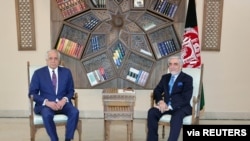The U.N.’s top diplomat in Afghanistan sought to lower expectations of a quick peace deal between the Afghan government and Taliban, saying Tuesday that peace is possible, but it will not come immediately, as “genuine and profound differences” exist between the two sides.
“Afghans and their international partners have begun to voice understandable frustrations about the lack of real outcomes, against the incredible backdrop of extreme violence throughout the country,” said Deborah Lyons, the head of the U.N. Assistance Mission in Afghanistan (UNAMA). “It is notable, however, that both sides in the negotiations have been dedicated to remaining at the negotiation table in Doha and continue with the talks.”
Peace negotiations began last September in the capital of Qatar. She told a meeting of the U.N. Security Council that progress has slowed recently and several countries have tried to reinvigorate the peace process.
The United States is among them, suggesting a meeting in Turkey of senior Afghan leaders in the coming months. In Moscow, the extended “Troika” of Russia, China, the United States and Pakistan, met last Thursday. Also last week, U.N. Secretary-General Antonio Guterres appointed veteran French diplomat Jean Arnault as his personal envoy to work in tandem with Lyons to enhance support for the negotiations among Afghanistan’s neighbors.
Lyons said there are issues which will require time and patience for the government and Taliban to resolve, but she believes “peace is possible.”
“Afghans are not just ready for peace, they are demanding it,” she said. “And all sides need to stop the violence and need the violence to stop.”
Targeted killings
Violence in Afghanistan has reached unprecedented levels since the talks began. In the first two months of this year, the U.N. mission recorded the deaths of more than 80 civilians – many of them in targeted attacks. Victims have included media, civil society, members of the judiciary, religious scholars, government officials and last week, a three-year old child.
“These attacks are meant to dissuade the participation of women and youth in the peace process, create widespread panic, and crush our aspiration for peace,” said Afghanistan’s U.N. Ambassador Adela Raz.
Raz and U.N. Security Council members have been emphatic that Afghan women must participate in large numbers in the peace talks, and that any final deal preserve the gains they have made over the past twenty years. Only four women have been present at the table in Doha.
“We must do more to support the women and girls of Afghanistan,” U.S. Ambassador Linda Thomas-Greenfield said. “Any agreement must preserve their gains if Afghanistan wants to ensure the international community’s continued political and financial support. We will not give an inch on this point.”
Council members also expressed concern about the intensifying humanitarian crisis in the country. The U.N. warns that more than 18 million Afghans may need assistance this year – double the 2020 figure. This would make it the largest humanitarian crisis in the world – surpassing Yemen which is on the brink of widespread famine.
The United Nations says 40% of the Afghan population is enduring crisis levels of food insecurity due to a combination of conflict, drought and now COVID-19. It has asked donors for $1.3 billion in aid but has only received 6% of the funds needed.





